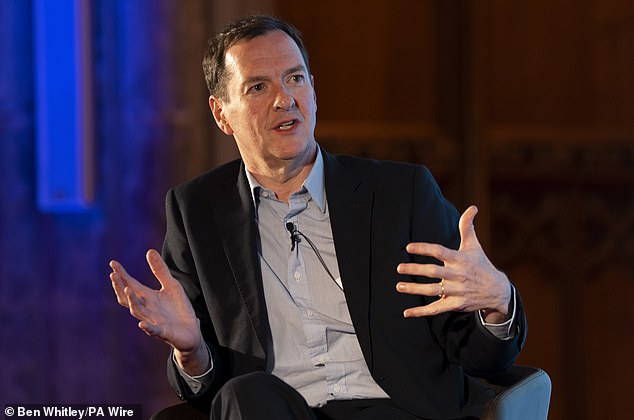[ad_1]
The presence of George Osborne at boutique advisers Robey Warshaw, and the fabulous payouts to partners following the £146million sale to New York upstart Evercore, is certain to garner attention.
Ex-Chancellors have enjoyed stellar City careers after stepping down. Nigel Lawson at Barclays and John Major at private equity barons Carlyle come to mind.
Fortunes beyond the dreams of avarice rarely are achieved. Of more interest is what Evercore thinks it is buying.
In founders Simon Robey and Simon Warshaw, it is acquiring dealmakers supreme who advised on many of the biggest takeovers of our time without being encumbered by an army of traders and financiers. Raising the loans and bonds is left to other houses.
Since starting out just over a decade ago, the firm has advised on £452billion of bids and deals, including landmark transactions such as Comcast’s acquisition of Sky and Softbank’s takeover of British smart chip innovator Arm.
Suffice it to say, the firm has been a hidden hand in selling some of the UK’s crown jewels.

Windfall: Former chancellor George Osborne is set for a multi-million-pound payday after Robey Warshaw was snapped up by a US rival Evercore for £146m
However, together Robey Warshaw and Evercore were part of the defence team which saved AstraZeneca from the clutches of US predator Pfizer.
Evercore should benefit from that expertise, but it is likely to prove a depreciating asset. Robey Warshaw doesn’t bear much comparison to the more diverse previous generation of UK merchant bankers.
Nevertheless, starting in 1989 when Deutsche Bank snapped up Morgan Grenfell, merchant banks became a doomed species.
In 1995 Swiss Bank Corporation, later absorbed by UBS, bought Britain’s top dealmaking house SG Warburg.
Five years later, Citigroup swooped on Schroders investment banking arm and Chase Manhattan (now part of JP Morgan) gobbled up Robert Fleming. JP Morgan would buy blue-blooded corporate broker Cazenove in 2009.
All these deals represented the effort by the European and American banks to gain a bigger hold in the City, in much the same way as Roger Altman’s Evercore now seeks to do.
In the sometimes-stuffy atmosphere of the historic Square Mile, the presence of old-line names and networks was useful over the short-term.
The boost often proved temporary with respected names removed from letterheads and rainmakers drifting away.
The patient, organic approach of Goldman Sachs, which first caught the eye when it defended ICI against Hanson in 1991, arguably proved more durable. Evercore’s approach is a pricey long shot.
China syndrome
All is not well at HSBC. It was the choice of the former management team of chairman Mark Tucker and Noel Quinn to extricate the bank from markets across the globe and focus on Asia. In terms of catching the high-speed train in the Pacific and Middle East it made sense.
Over-exposure to Hong Kong and the unknowable events in China were always a risk.
The bank’s 26 per cent slide in profits contrasts sharply with bumper outcomes at the UK’s other High Street banks and most American lenders.
Income fell in the first half of the year as HSBC suffered from declining Hong Kong property values and a hit of £1.6billion on its investment in China’s Bank of Communications.
Identifying a new chairman, with sufficient silky skills to keep Beijing on side, has proved tricky. But investors should be reassured by a fresh £2.3billion share buyback, on top of that already unveiled.
Holding the line
One of the oddities of online lender Revolut, as it grew into a £33.6billion behemoth, has been its operations using a less-than-universally recognised Lithuanian banking licence.
Rachel Reeves, anxious to underpin the UK’s reputation for being at the cutting edge of fintech, is seeking to smooth its transition to a full British bank.
Bank of England governor Andrew Bailey is less gung-ho. As former head of the Financial Conduct Authority and someone deep in the engine room at the time of the 2008 financial crisis, he naturally is reluctant to kick away the traces just yet.
Revolut thinks that buying a US bank might provide an easier route to approval.
Founder Nikolay Storonsky should be concerned that Bailey will get to Fed chair Jay Powell and block permissions, before Trump dispenses with his services.
DIY INVESTING PLATFORMS

AJ Bell

AJ Bell
Easy investing and ready-made portfolios

Hargreaves Lansdown

Hargreaves Lansdown
Free fund dealing and investment ideas

interactive investor

interactive investor
Flat-fee investing from £4.99 per month

InvestEngine

InvestEngine
Account and trading fee-free ETF investing
Trading 212
Trading 212
Free share dealing and no account fee
Affiliate links: If you take out a product This is Money may earn a commission. These deals are chosen by our editorial team, as we think they are worth highlighting. This does not affect our editorial independence.
[ad_2]
This article was originally published by a www.dailymail.co.uk . Read the Original article here. .

